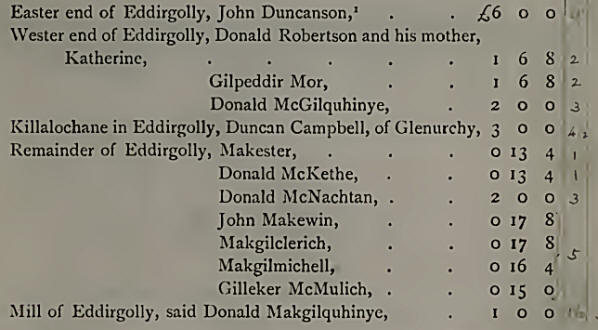|
THE district which extends
from Auchroich burn at Callelochan to the east end of Loch Tay, was
anciently known as Eddergoll. This name has been long obsolete, and is
entirely unknown on Loch Tayside as a local place-name. From the Crown
Rental of 1480, we find the district was then divided into Easter end of
Eddirgolly, Wester end of Eddirgolly, Killalochane in Eddirgolly, and the
Remainder of Eddirgolle. The mill of Eddirgolly is also mentioned. In the
Exchequer Rolls for i486, the name appears as Ardgollane, and the Wester end
is described as lying infra torrentes, while Killalochane is referred to as
being in Nethergolly, and the mill as de Argolly. In the Chronicle of
Fothergill’ we find other forms of the word:—“ 1531, August 11, Death of
Duncan McConell Gorme at Rayn (Remony?) in Eddirzowell, and he was buried in
the church of Inchaden at the north end of the Host Choir.” “ 1556, John
Challar Moyr died at Eddergooyllyt, on the 27th of September, and was buried
at Inchaden, on the eve of St. Michael the Archangel.”
Eddergoll appears to have
been annexed to the Crown at a very early period, and until set in tack and
eventually feued out to the lairds of Glenorchy, the lands were held by the
different tenants direct of the king.
The following is a list of
the Crown tenants in 1480, with the amount of rent in money payable by
each:—

The leases of these tenants
were of three years’ duration, and appear to have been renewed for a similar
period at the end of the first year.
The above divisions of the
lands cannot now be localised, but we are inclined to think that Easter end
of Eddergoll extended from the east march of Croftnacaber to Allt Mhuicky,
and that Wester end of Eddergoll lay betwixt the latter and Acharn burn,
while the Remainder of Eddergoll stretched to the east march of Callelochan.
In all probability the mill, of which Donald Makgilquhinye was tenant, would
have stood near the site of the present mill, by the side of Acharn burn,
and on the land which he held, which was in Wester end of Eddergoll, and if
we take torrentes to mean the Falls of Acharn, there seems little doubt that
Wester Eddergoll was where we conjecture, and that the Remainder of
Eddergoll lay to the west of Acharn burn, strange as this may appear. There
is no record of any ancient fortalice in the district, but the names, Leod
Chastle and Tom Chastle,
1 The following entry in the
Chronicle of Fother gill may refer to the above :—“ 1491, March 10, Death of
John Duncansone McGregor, at Bellycht; and he was buried in Inchaden on the
north side of the great altar.” applied respectively to a field and hillock
on the farm of Call-elochan, would imply that some structure had stood
there; and the fact of the majority of the tenants being congregated in the
Remainder of Eddergoll may point to the supposition of their being so
placed, to render prompt aid to the occupier of the castle in time of need.
Coming nearer our own times,
we find the district sub-divided, and the holdings bearing the following
names :—Callelochan, Achianich, Wester Lurgloman, Easter Lurgloman, Wester
Croft-martaig, Easter Croftmartaig, Wester Acharn, Easter Acharn, Wester
Balnlaggan, Easter Balnlaggan, Meadow of Lonaguy, Tomgarrow, Revucky,
Aleckich, Remony, Croftnamuick, Balmac-naughton (or forty-shilling land),
Portbane and Croftnacaber. The last named is bounded on the east by what
were formerly the outfields and pasture lands of Kenmore, now under wood.
The small artificial island in Loch Tay, opposite Croftnacaber, formed prior
to 1720, and enlarged by the second Marquis of Breadalbane, was known as
Spry or Spries Island, but appears in the Ordnance Survey as Isle of Spar.
There is an eminence on the farm of Remony, called Tom Chorpuidh, where
probably feuds were settled long ago, but so far as we are aware, there are
no traditions preserved concerning it. The district is very void of
antiquities of any note. |

